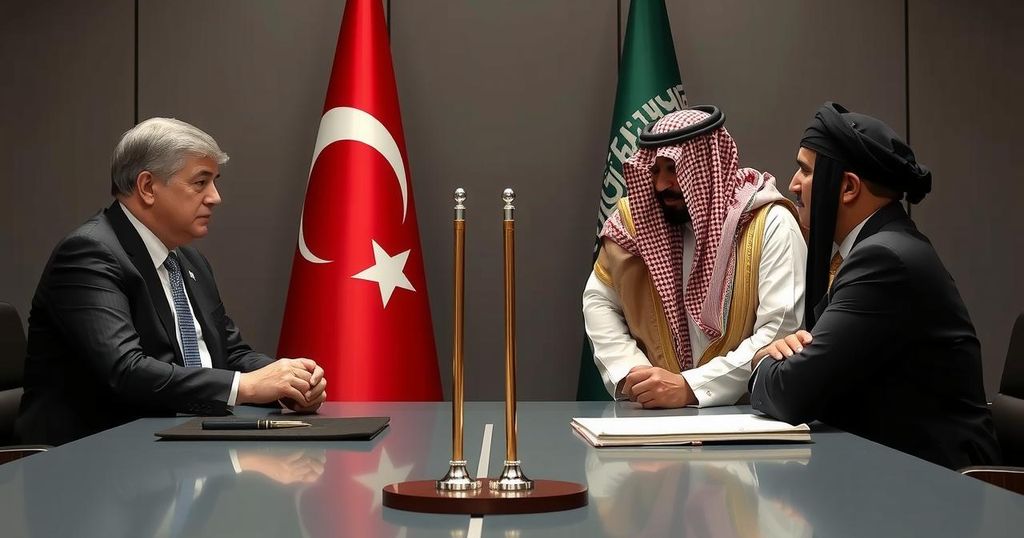Turkey Pursues Gulf Support to Shape Syria’s Future

Turkey is seeking the support of Saudi Arabia and the UAE to stabilize Syria following the collapse of Assad’s regime. President Erdogan aims to engage Gulf nations to influence the future governance structure and is cautious about repeating past errors from the Arab Spring. Key discussions led by Turkish officials focus on forming a non-sectarian government while recognizing the intricate role of groups like HTS and the implications of Russian involvement in the region.
Turkey is actively seeking the backing of Saudi Arabia and the United Arab Emirates (UAE) to navigate the complexities surrounding the future of Syria following the swift deterioration of Bashar al-Assad’s regime. Turkish officials display a cautious approach, drawing lessons from the tumultuous aftermath of the Arab Spring and emphasizing the necessity for regional and international collaboration to stabilize a nation significantly affected by the conflict. President Recep Tayyip Erdogan aims to engage Gulf nations, which have reservations toward certain movements, to add momentum to Turkey’s vision for a post-Assad Syria.
During an upcoming summit in Cairo, Erdogan is anticipated to confer with Egyptian President Abdel Fattah el-Sisi about the prospective governance structure in Syria, especially given the latter’s known aversion to Islamist factions. Turkey’s ambitions extend beyond mere dialogue, delving into intricate geopolitical relationships that will influence Syria’s new administration’s formation.
Although Turkey has publicly distanced itself from supporting the extremist group Hay’at Tahrir al-Sham (HTS), it is well aware of the group’s significance in the region’s dynamics, with Turkish Foreign Minister Hakan Fidan acknowledging Turkey’s comprehensive understanding of HTS. In collaborations with various international entities, Ankara has stressed the urgency of establishing a non-sectarian and inclusive governance structure in Syria. Fidan’s assertion of Turkey’s desire for stability underscores a commitment to minimizing threats, particularly that posed by terrorism, to neighboring countries.
Turkey has been vocal about its repudiation of both Iranian and Turkish domination in the region, advocating for a collective regional approach among Middle Eastern states that honors mutual sovereignty. Recent changes in Gulf rhetoric towards Syria, particularly from the UAE, signal a potential shift in regional allegiances that can affect future investments in Syria’s economy, a necessity for the nation’s reconstruction.
Meanwhile, while European stakeholders have expressed readiness to engage in Syria’s recovery, the role of Russia complicates the scenario. Russia’s military involvement and historic support for Assad create challenges for the establishment of a new administration. Observers anticipate that geopolitical negotiations may hinge on HTS’s potential delisting from international terrorist lists, a scenario that could entice further international support in lieu of Russian withdrawal from the region. Turkey envisions a cooperative future in Syria, contingent upon diplomatic agreements that remain sensitive to the complex interplay of regional powers.
The Syrian conflict, which began over a decade ago, has resulted in profound geopolitical turmoil that continues to shape relations among regional players. Turkey, having opposed the Assad regime, is now tasked with navigating an increasingly complicated landscape marked by the emergence of various factions, including HTS, as well as the influence of major powers like Russia and Iran. The nation is focused on promoting stability and countering extremist threats while fostering a political environment conducive to investment and reconstruction. Turkey’s overtures toward Gulf States aim to create a unified front against Iranian influence and garner necessary financial support for Syria’s future.
In conclusion, Turkey’s strategic engagement with Saudi Arabia and the UAE is a crucial element in its broader objective to influence Syria’s governance in the post-Assad era. With an emphasis on neutrality and stability, Turkey seeks to mitigate Iranian and extremist threats while cultivating cooperative regional relationships. The evolving geopolitical dynamics necessitate a delicate balancing act, particularly given the implications of Russia’s presence and the need for a unified approach towards reconstructing Syria. The potential for a new diplomatic order in the region hinges on collaborative efforts among Middle Eastern nations and external partners.
Original Source: www.middleeasteye.net








